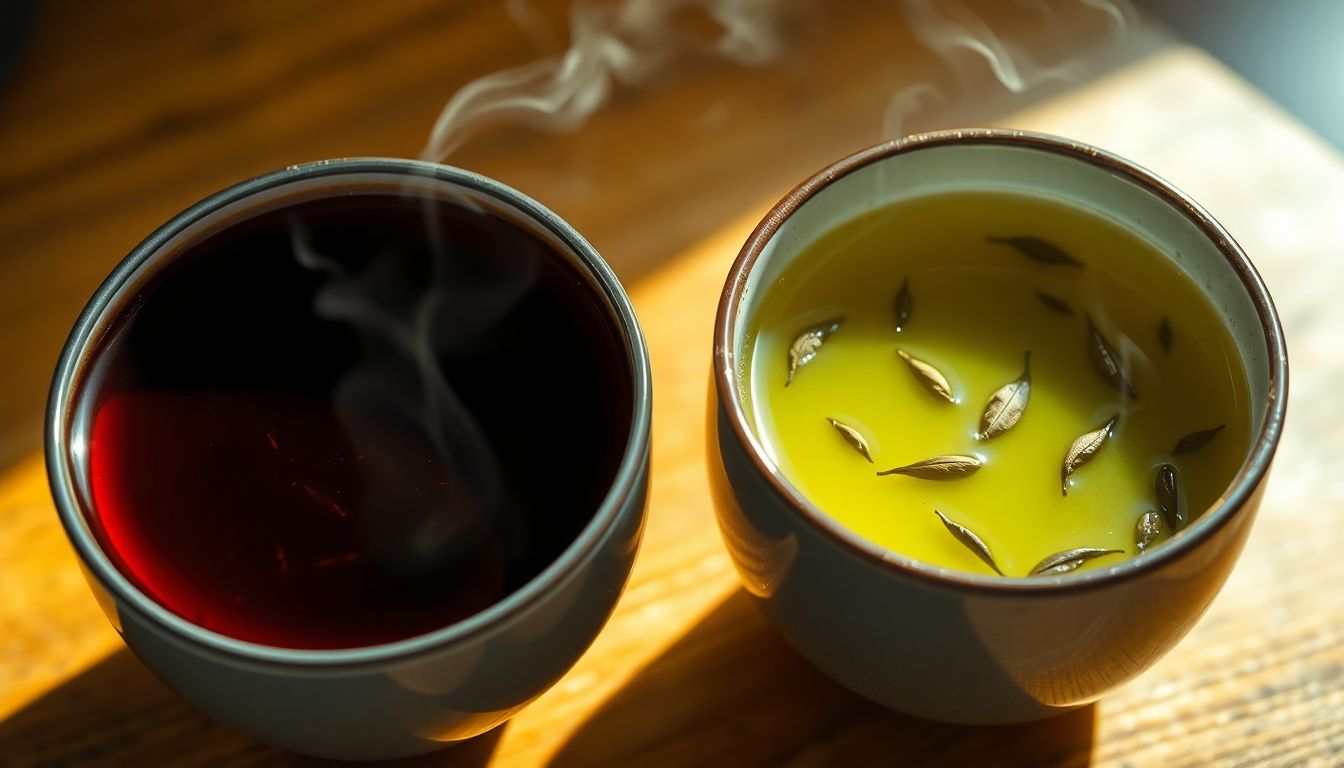Here's your article:

Black Tea vs. Green Tea: Unveiling the Differences, Benefits, and Best Choice for You
Do you reach for a steaming cup of tea each morning? Or maybe you crave an afternoon pick-me-up. Black tea and green tea are popular choices, enjoyed worldwide. But what truly sets these two brews apart? This guide explores their differences and health benefits. It will help you decide which tea is perfect for you.
What Sets Them Apart: Processing and Production
Black and green tea come from the same plant, Camellia sinensis. It is the processing that makes all the difference. The way the leaves are handled changes everything. This affects the flavor, color, and even the health benefits of your cup.
Oxidation: The Key Differentiator
Oxidation is the main factor in creating different teas. Black tea is fully oxidized. Green tea, however, undergoes minimal oxidation.
Think of it like this: when you slice an apple, it turns brown. That's oxidation. Black tea leaves are withered, rolled, and then exposed to air to oxidize. This process gives black tea its dark color and bold flavor. Green tea skips this step. The leaves are quickly heated, either by steaming or pan-firing. This prevents oxidation. So, green tea retains its green color and fresh taste.
Regional Variations and Cultivars
Where tea is grown also changes how it tastes. Tea from India may taste different than tea from Japan. The Camellia sinensis plant has many varieties, called cultivars. Some are better suited for black tea, others for green. These factors play a big role in the final flavor of your brew.
Flavor Profile Face-Off: Taste, Aroma, and Body
Black tea and green tea offer very different experiences. It's not just about the color; it's about the whole taste. Let's take a closer look.
Black Tea: Bold, Malty, and Robust
Black tea often has a strong, bold flavor. You might notice malty, brisk, or even smoky notes. English Breakfast tea is a popular choice, known for its robust flavor. Earl Grey offers a citrusy twist, thanks to the addition of bergamot oil. Assam tea, from India, has a malty and rich taste. These teas can often hold up well to milk and sugar.
Green Tea: Grassy, Vegetal, and Refreshing
Green tea is often described as grassy and refreshing. Some varieties have a vegetal or marine-like flavor. Sencha tea is a classic Japanese green tea, with a balanced flavor. Matcha tea is a powdered form of green tea, offering a more intense, vegetal taste. Gyokuro tea is shaded before harvest, resulting in a sweeter, umami flavor. It's a lighter taste compared to black tea.
Health Benefits Breakdown: Antioxidants, Nutrients, and More
Both black and green tea are good for you. They contain antioxidants and other helpful compounds. These teas can help boost your health.
Black Tea: Heart Health and Gut Microbiome
Drinking black tea may be good for your heart. Studies show it can improve cholesterol levels. It also has benefits for your gut. Black tea may help promote healthy gut bacteria.
Green Tea: Cancer Prevention and Brain Function
Green tea is known for its potential cancer-fighting properties. EGCG, a powerful antioxidant, is found in green tea. Research shows EGCG may help protect against certain cancers. Green tea is also great for your brain.
Caffeine Content: Energy Boost vs. Calm Focus
Caffeine is a key factor for many tea drinkers. Black and green tea both contain caffeine, but in different amounts. This difference affects how the tea makes you feel.
Black Tea: A Stronger Jolt
Black tea generally has more caffeine than green tea. This makes it a good choice for a morning energy boost. If you're sensitive to caffeine, drink it earlier in the day. This will avoid sleep problems.
Green Tea: A Gentler Lift
Green tea gives you a gentler lift. It contains less caffeine than black tea. Plus, it has L-theanine. This compound can promote relaxation and focus. Green tea is a smart pick before a workout. The caffeine and L-theanine work together.
Choosing the Right Tea for You: Factors to Consider
Picking the right tea depends on you. Think about what you like and what your body needs. Here's how to choose.
Taste Preferences and Pairing Suggestions
Do you like bold flavors? Black tea might be for you. Do you want something lighter? Try green tea. Black tea pairs well with scones and pastries. Green tea is a great match for sushi and other Asian dishes.
Health Goals and Dietary Restrictions
Do you want to manage your weight? Green tea could help. Worried about your heart? Black tea may offer benefits. Keep caffeine sensitivity in mind. Choose accordingly.
Conclusion
Black tea and green tea each offer something unique. Black tea gives you bold flavors and heart health perks. Green tea provides a light taste and brain-boosting benefits. In the end, the best tea is the one you enjoy the most. Explore the world of tea. Find your perfect cup.





0 Comments